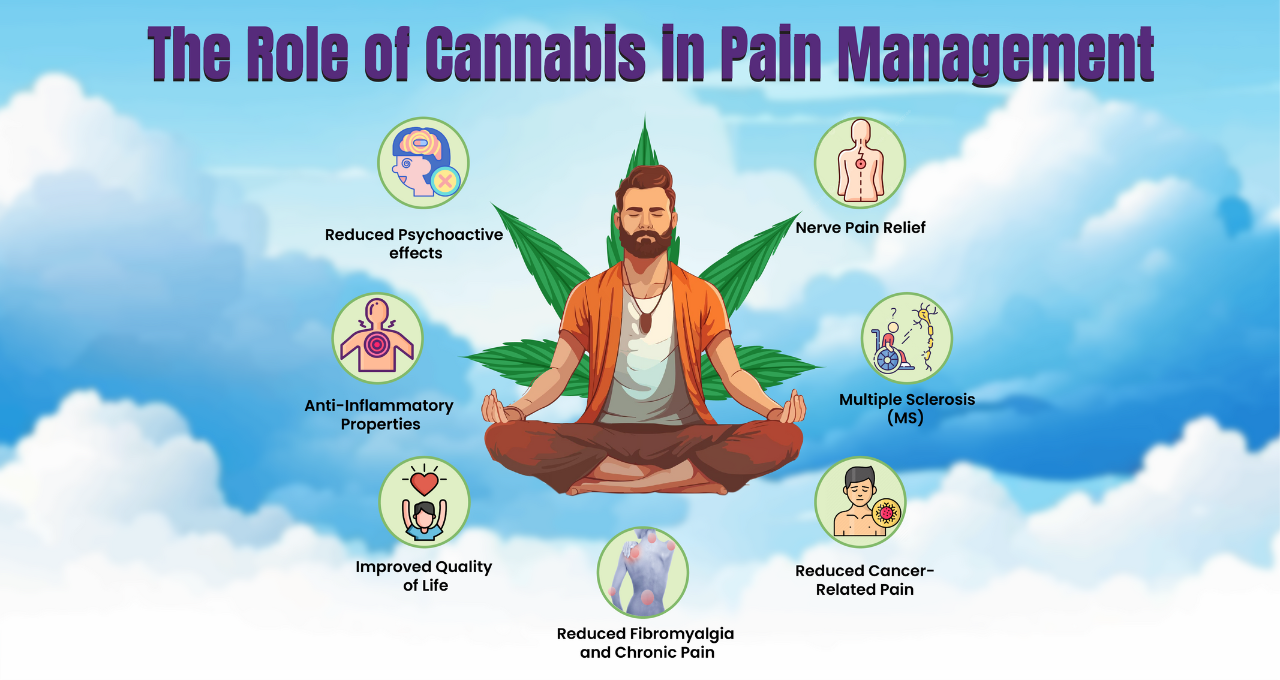20 Dec 2024
The Role of Cannabis in Pain Management: What Science Says
As more people seek natural options to manage their pain relief, cannabis is emerging as a hopeful alternative health option to traditional pharmaceutical painkillers. For those who live with chronic pain, finding relief can be a challenging, ongoing journey, and many are curious about whether cannabis might finally offer a solution that's effective and manageable.
Researchers are working to understand how cannabis compounds interact with our bodies, but even in the early stages, there's encouraging evidence that cannabis can ease some of the daily discomfort and improve the quality of life for those dealing with persistent pain.
Visit us at Sociale Dispensary, the best dispensary near Park Ridge, to discuss options that may help you. Until then, here’s a closer look at what science has uncovered so far about using cannabis for pain relief and how it might offer a new path forward for those who need it most.
How Cannabis Affects Pain
Cannabis taps into the body's natural pain-regulation system through its main compounds, cannabinoids—particularly THC (tetrahydrocannabinol) and CBD (cannabidiol). These compounds interact with our endocannabinoid system (ECS), which is a network of receptors spread throughout the body involved in regulating pain, inflammation, mood, and other functions. When these cannabinoids engage with the ECS, especially CB1 and CB2 receptors, they can help alter our body's response to pain and inflammation, making them beneficial for natural pain relief.
THC: THC is the main component of cannabis responsible for that elevated "high" feeling. By connecting with the CB1 receptors, which are abundant in the brain and nervous system, THC changes the way pain signals are processed and perceived, often reducing pain sensitivity. THC also stimulates the release of dopamine, leading to improved mood and relaxation, providing a distraction from discomfort and pain. For those dealing with intense pain, THC's ability to alter pain perception directly in the brain and nervous system can help significantly.
CBD: Unlike THC, CBD doesn't bind strongly to CB1 or CB2 receptors. Instead, it works indirectly by increasing the body's levels of endocannabinoids (cannabinoids naturally produced by the body) and interacting with other receptors like TRPV1, which signals pain, heat, and inflammation. CBD's indirect approach helps reduce inflammation and modulate pain signals without causing a high. It's often preferred by those looking for consistent natural pain relief, as it tackles both the inflammatory source of pain and the way pain signals are sent through the body.
Together is always better, as THC and CBD often boost each other's efficacy and offer complementary relieving effects. THC acts quickly on pain perception, while CBD provides a supportive, anti-inflammatory boost that keeps pain levels manageable for a longer period of time. This makes it possible for people to find a balance that works for their specific needs—whether that's using THC, CBD, or a combination of both to feel comfortable and in control of their pain.
Research on Cannabis for Chronic Pain
Cannabis continues to be studied for its potential impact in relieving various forms of chronic pain, including neuropathic (nerve) pain, inflammatory pain, cancer-related pain, and central pain seen in conditions like multiple sclerosis (MS). As research progresses, findings suggest that cannabis may serve as a valuable alternative health option or complementary treatment for natural pain management.
Neuropathic Pain Relief
Neuropathic pain, which is caused by damaged or dysfunctional nerves, is notoriously difficult to treat with traditional painkillers. Opioids and other traditional medications reduce inflammation or block pain signals from injured tissues, but they don't always target the dysfunctional nerve signals. This is where cannabis comes in. Studies suggest that THC may relieve nerve pain by binding to receptors and dulling the brain's pain response. And while it doesn't "cure" the nerve damage, it does provide immense relief by altering how pain is perceived. A review in the Cochrane Database of Systematic Reviews found moderate evidence supporting cannabis-based treatments for neuropathic pain.
A study in the Journal of Pain also found that even low doses of THC effectively reduced pain signals associated with nerve damage while keeping side effects minimal, positioning cannabis as a safer option for managing this challenging condition.
Relief for Arthritis and Inflammatory Pain
When it comes to inflammatory conditions like arthritis, both THC and CBD offer anti-inflammatory benefits that can ease pain. Research in Journal of Cannabis Research has shown that cannabis reduces joint inflammation in arthritis patients, helping them manage pain without relying on NSAIDs or opioids. A 2020 study also provided that CBD topicals and oils offered significant local pain relief for arthritis sufferers, highlighting CBD's potential as an anti-inflammatory solution.
Cannabis & Multiple Sclerosis and Central Pain
In central nervous system conditions like multiple sclerosis, cannabis has shown promise in natural pain relief and muscle spasticity. A study published in Neurology Journals found that THC-CBD combinations significantly offer pain relief and muscle stiffness in MS patients. This relief led to the approval of cannabis-based treatments like the THC-CBD spray Sativex in some countries, where it's used to alleviate MS-related symptoms and improve quality of life.
Cannabis & Cancer-Related Pain
Cannabis also offers significant potential for managing pain associated with cancer and cancer treatments. Cancer pain can be intense and multifaceted, often due to tumors pressing on nerves or treatment side effects. Studies have shown that cannabis can be particularly effective for pain relief in cancer patients, with THC and CBD both helping to relieve discomfort like nausea or even acting as an appetite stimulant while also improving sleep. A study published in the Journal of Clinical Oncology found that patients using cannabis experienced meaningful pain relief and reduced dependence on opioids, highlighting cannabis as a beneficial adjunct therapy for cancer-related pain.
Cannabis & Fibromyalgia and Other Chronic Pain Conditions
Conditions that involve widespread chronic pain, like fibromyalgia, are also being researched to see how cannabis treatment may impact them. Fibromyalgia can be particularly difficult to manage, as it affects both physical and mental health. A study published by National Institutes of Health showed that cannabis helped pain relief options and improve sleep quality in fibromyalgia patients, suggesting it may offer comprehensive relief where other treatments fall short. Additionally, chronic migraines and cluster headaches are also being studied, with cannabis showing promise for reducing both frequency and severity.
Advantages of Using Cannabis for Pain
One of the biggest advantages of cannabis for pain management is its ability to offer relief without many of the risks associated with traditional painkillers, especially opioids, which can lead to dependency and dangerous side effects. Beyond just pain relief, cannabis provides a range of additional benefits that can improve the overall quality of life for those dealing with chronic pain. Here are some of the main advantages:
Reduced Opioid Use
With the opioid crisis ongoing, there's a strong push to find safer, effective alternative health options for pain relief—and cannabis has emerged as a promising option. Studies indicate that cannabis can complement opioid therapy, helping patients achieve pain relief with lower opioid doses. This can reduce the risk of dependency and side effects associated with long-term opioid use. In states where medical cannabis is legal, research has shown a significant drop in opioid prescriptions as more patients turn to cannabis to manage pain relief instead. This shift is helping to reduce the strain on patients and healthcare providers alike.
Improved Quality of Life
Cannabis has been found to not only reduce pain but also boost the quality of life for many people dealing with chronic pain. A survey published in Health Affairs found that over 80% of medical cannabis users experienced improvements in pain relief, sleep, and overall mood. Many users report that cannabis helps them relax, which leads to stress relaxation and better sleep quality. This holistic impact can be transformative, helping patients manage their physical pain as well as the mental toll it often takes.
Better Sleep and Restoration
Chronic pain can make it hard to get a good night's sleep, which can worsen mood and pain over time. Cannabis, particularly strains higher in THC or those with specific terpene profiles like myrcene, can promote deeper, more restful sleep. CBD also helps by calming the mind and reducing anxiety. Patients often feel more energized, mentally sharp, and better equipped to handle their pain throughout the day when they are well-rested.
Reduced Inflammation
Cannabis, especially CBD, is known for its anti-inflammatory properties, which can help relieve conditions rooted in inflammation, like arthritis and certain autoimmune disorders. By reducing inflammation, cannabis also may offer pain relief and prevent future flare-ups. This anti-inflammatory action provides a more natural, targeted approach to pain relief than traditional medications, which often come with negative side effects when used long-term.
Low Risk of Severe Side Effects
Cannabis is not known to have the same kind of severe side effects found in other medications. The most common complaints, like dry mouth or mild dizziness, are usually manageable and temporary. This makes cannabis a go-to option for people who may be sensitive to traditional medications or who want to avoid the side effects of long-term pharmaceutical use.
Personal Control Over Dosage and Experience
Cannabis offers a level of flexibility that's hard to match. Patients can choose between various forms like oils, edibles, or topicals to customize their dosage and method and find what works best for them. This level of control allows for a personalized approach to natural pain management, where patients can prioritize what kind of relief and effects they wish to feel.
Potential Mood Enhancement and Anxiety Reduction
Beyond the physical effects of chronic pain, it can take a toll on your mental health. Many people dealing with ongoing pain experience anxiety, depression, or low energy. Cannabis strains with higher THC or balanced THC-CBD ratios can help elevate mood and stress relief. CBD, on the other hand, has been shown to reduce anxiety without any mind-altering effects, making it ideal for those who want to stay clear-headed.
Natural Alternative Health Options
Cannabis provides a natural, plant-based alternative health option for pain relief that appeals to those who want to avoid synthetic drugs. With an increasing focus on holistic health, cannabis fits into a lifestyle that values organic remedies, whole-plant therapies. This is especially meaningful for people who want to know exactly what they're putting into their bodies.
Cannabis offers a versatile and often safer option for managing chronic pain, with benefits that extend well beyond pain relief alone. Whether by reducing reliance on opioids, improving sleep, or enhancing overall well-being, cannabis is helping many people live fuller, more comfortable lives despite chronic pain.
What Are the Risks?
Cannabis has shown to be a promising pain reliever, but it's not a one-size-fits-all solution. Every person’s body can respond to it differently. It's important to be aware of potential risks to make the best choice for your needs.
Psychoactive Side Effects
THC, the primary psychoactive compound in cannabis, can cause mind-altering effects that not everyone finds enjoyable or comfortable. This can range from mild euphoria to feelings of anxiety or paranoia, especially when taken at higher doses. For those new to cannabis or sensitive to THC, starting with a low dose and going slow is important to find the level of effect that's comfortable. CBD-only or low-THC products are also good options if you prefer a clear-headed experience.
Dependence and Tolerance
Though cannabis is less addictive than many traditional pain medications, there is still a risk of developing dependence or tolerance, particularly with long-term, high-THC use. Over time, some users may find they need larger amounts to achieve the same effect, which can lead to dependency. To keep this in check, many experts recommend mixing in CBD, which doesn't carry the same risk of dependence, switching up your strains or terpene profiles to keep getting similar relief, or taking periodic breaks to reset your tolerance if possible.
Interactions with Other Medications
Cannabis can interact with certain prescriptions, such as blood thinners, antidepressants, or anti-seizure drugs, by the way they inhibit the liver enzymes involved in metabolizing these medications. If you're on any prescription drugs, it's a good idea to check with a healthcare provider before adding cannabis to your routine to avoid any unexpected interactions or side effects.
Impaired Coordination and Judgment
THC can temporarily impair coordination, judgment, and reaction time and can sometimes leave you feeling foggy or forgetful, which is why it's best to avoid activities like driving or operating heavy machinery while using cannabis. Even though many users develop a tolerance, it's good practice to be cautious, especially when trying new products or adjusting your dose.
Legal and Workplace Considerations
Cannabis laws vary widely by region, and even in states where cannabis is legal, some workplaces have policies prohibiting its use. Make sure to consider local regulations and workplace guidelines before incorporating cannabis into your pain management plan.
Though cannabis offers many benefits, nothing comes without risk, and it's important to stay informed on potential drawbacks. Take a thoughtful approach to your consumption by starting slow, monitoring the effects, and speaking with your doctor so you can enjoy the rewards of cannabis while minimizing any downsides.
Choosing the Right Cannabis Product for Pain
With technology today, there are various ways to consume cannabis, each offering unique effects and suited to different types of pain relief needs:
Inhalation (Smoking/Vaping): Fast-acting and ideal for sudden onset pain, with effects that kick in within minutes but wear off relatively quickly—best for short-term relief.
Edibles and Oils: Provide longer-lasting effects (4-6 hours or more), ideal for consistent, sustained pain relief. They take longer to set in (30 minutes to 2 hours) but offer steady relief once active.
Topicals: Cannabis-infused creams or balms are not psychoactive, so they are perfect for a wide range of users for localized pain, like sore joints or muscles, as they are absorbed through the skin barrier rather than the bloodstream.
Tinctures: Offer quick and sustained relief with just a few drops under the tongue. Tinctures kick in within 15-45 minutes, providing a versatile option for varied natural pain relief needs.
Each method offers a different experience, so experimenting with the form that best aligns with your pain relief goals, lifestyle, and comfort level can help you find the most effective approach for managing your symptoms.
Balancing THC and CBD
Balancing THC and CBD can create a more comfortable and effective pain relief experience. Products with equal parts THC and CBD, or a higher CBD content, are especially popular for natural pain relief because they provide relief without the full psychoactive effects of THC alone. THC works by binding directly to receptors in the brain that regulate pain and mood, which can deliver strong relief but often comes with a noticeable "high."
CBD, however, interacts differently. It influences these same receptors more gently and even tempers some of THC's effects, reducing the intensity of the high. When THC and CBD are balanced, you get pain relief that's potent but less likely to be overwhelming. This lets you stay clear-headed while managing your pain, making these balanced products ideal for people who want steady relief without too much mental impact. For many, this blend offers the best of both worlds—effective pain management with minimal psychoactive effects.
Cannabis shows real promise for helping people manage chronic pain and improve their day-to-day quality of life. It's important, though, to take time to figure out what works best for you—working with a healthcare provider can help you find what's safe and effective for your unique needs. Our knowledgeable team at Sociale Dispensary, the best dispensary near O’Hare, can help guide you to find high-quality cannabis products that may help with your pain relief goals. As research continues, cannabis may become an even more trusted option in pain management, offering a natural alternative health option with fewer side effects than many conventional pain meds.




